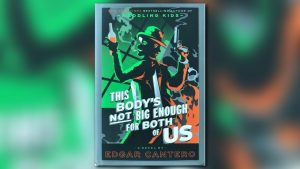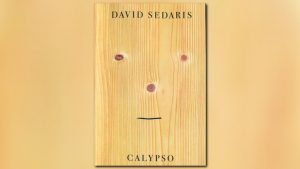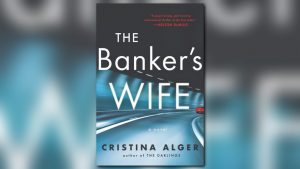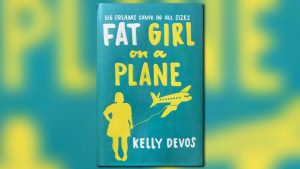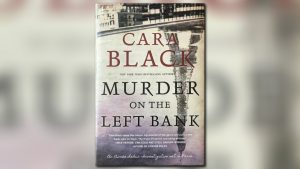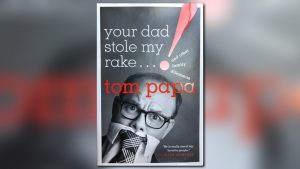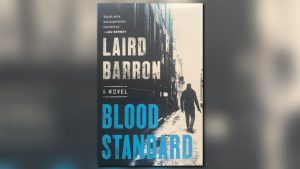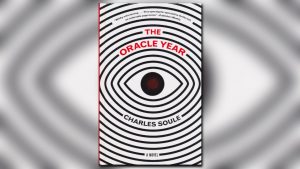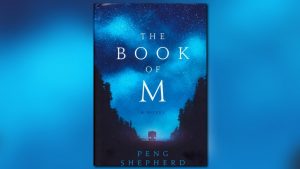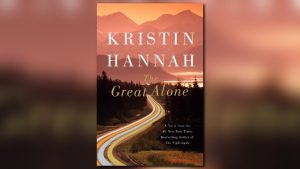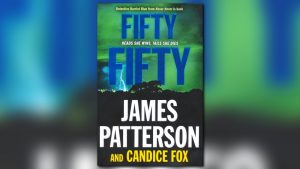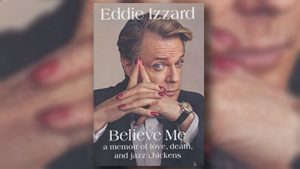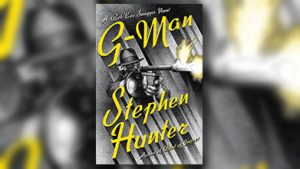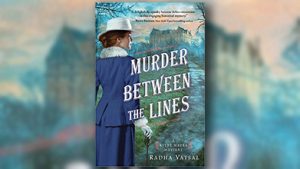Reeling Through Life: How I Learned to Live, Love, and Die at the Movies takes readers through Ison’s life and how movies have shaped her throughout the years.
This collection of essays integrates screenplay lines and formatting to show the connection between her life and the life and era of the movies across time.
This novel peers into the reality of how movies shape identity and how we perceive each other as humans.
VOICEOVER: And now an Eight original production.
VOICEOVER: Books & Co. is made possible by the Department of English at Arizona State University, and by the Friends of Eight, members of Eight, Arizona PBS, who give additional gifts to support original programs. Thank you.
ALBERTO RIOS: Welcome to Books & Co. I'm your host Alberto Rios. We're joined today by TARA ISON: talking about her latest book, "Reeling Through Life: How I Learned to Live, Love and Die at the Movies." Welcome, Tara.
TARA ISON: Thank you, thank you very much for having me, I appreciate it.
ALBERTO RIOS: I want to say how much fun I had reading this book.
TARA ISON: It's all about fun.
ALBERTO RIOS: Hard to know how to start with something like that. There are two things at work here. You have a whole sort of discourse on movies, a lot of citations and references. And then it's all about you.
TARA ISON: Uh-huh.
ALBERTO RIOS: Tell us a little bit about what you think the book is about, because I can't wait to jump in.
TARA ISON: The easy way to phrase it is part film criticism, part memoir.
TARA ISON: Actually my editor wanted me to write a nonfiction book. What are my passions, what do I have authority about, and I thought of books, dogs, knitting, and movies. And not that I feel I'm an authority on any of those things, but I'm passionate about them, I'm happy to spend a lot of time invested in those topics. He had suggested a memoir. I stumbled over that. I haven't traveled through Nepal or dealt with life altering items. I thought, what if I combined film and memoir, and what if I looked at film as a formative influence, a way of shaping identity. I could think about certain aspects of my identity, the more I thought about it the more I realized how influenced I've been by film and internalized film images and characters and lines of dialogue. Sometimes to the point I can't remember was this something I said or something I just remember hearing in a movie.
ALBERTO RIOS: The stakes are higher whether or not you've been influenced. You have this great line early on in the book. I've wondered about the influence the book had on my own authenticity.
TARA ISON: Absolutely.
ALBERTO RIOS: Are you really Tara?
TARA ISON: I think -- I actually can't answer. It would be hard for me to sift through what I feel is organically authentically intrinsically me, and what are layers of identity from film. You know, sin marks film is so powerful and it's so -- when I was writing the book I had done a lot of research on Catholicism for another book. I started to see a similarity between the rituals of Catholicism and films in the sense of how sensual it is. Sitting in that dark theater, you're so focused. You're in the dark and it's so immersive, these characters and the sounds are literally larger than life. The power of that experience to get under your skin is really profound. They say, you know, a Catholic upbringing, you never quite shed that, it gets under your skin. I think cinema is equally powerful.
ALBERTO RIOS: Ironically you talk about Jewishness in this particular book. You talk about yourself and also your greater self, family. How does that work and how do you get away with that?
TARA ISON: The good thing is I had my parents' permission. I had blessings from both of them, my mother before she died to write anything about her, our family to write about anything I wanted to. However I wanted to write about any of that, I had her blessing. My father is still alive and he also has said, you take any of it that you want and write anything you want. There's certainly ethics of family history I didn't touch on. Partly because they were things I was perhaps not ready to write about, or out of respect for another person's experience, or simply because I couldn't find the nexus between that aspect of my history or my family history and film. That was sort of the guiding principle with the book, which films I was going write about, which elements of my own life I was going to write about and explore. A lot of things happened in my life that aren't in the book. A lot of movies I adore passionately that aren't in the book either.
If I couldn't find that influential moment of sitting in the dark and having that image that, line of dialogue directly influence me. Even though I might not have appreciated the influence for many years, now I can look back -- I left it out. It really needed to be about how does looking at these films illuminate something about my own life, and how does my own life become enriched through a discussion of these films.
ALBERTO RIOS: It's an interesting way to think about structuring, to let something else help you with that.
TARA ISON: You've got all the permissions in the world. But that doesn't mean you end up
feeling good about exercising them.
ALBERTO RIOS: Are there any points in the would be you feel you went in a direction you're not so sure you should have or anything like that? I don't mean that in any strange way, I'm just curious.
TARA ISON: There are parts of the book that are awkward for me to read, that I've sort of -- once I wrote them I tried to ignore them. I can't call them up for you right now because I've probably blocked them out just a little bit. I think what I've always tried to do was put myself on the hot seat more than anybody else. And I wanted to be open-minded, you know, there's three sides to every story. Your experience, my experience and the truth is somewhere in between. It really wanted to stress the subject activity of its variance. Partly the subjectivity of my experience of my own reality but also the subjectivity of one's experience to a film. You'll have a different reaction to "The Ten Commandments" than I might. I really wanted to stress that these are my memories, what I took away from the experience, it's not necessarily what happened.
ALBERTO RIOS: Okay, we'll talk about that. We've talked about you then, and your parents' permission but there's still the reader out there. I wonder if there's another line that needs to be drawn. You say what you say but as a reader I'm voracious. I want to know more.
TARA ISON: I know you're voracious!
ALBERTO RIOS: You talk about different addictions, practices, different kinds of sexuality as a reader. I want to know a lot more, I don't want you to stop!
TARA ISON: I'll write a sequel.
ALBERTO RIOS: I don't know where you draw that line regarding the reader. You could write endlessly toward what the reader might be happy to read.
TARA ISON: I feel I'm always mindful of the reader, maybe not in the first draft, that's for me. When I begin to craft and shape the book, it's not for me anymore, it's for the reader's experience. And again, I probably kept going back to film. The themes of the book, there are nine essays, each one focused on some specific theme - love, sex, faith, death, addiction, career, family, et cetera, et cetera. And I really chose those themes sort of organically. I sat down and started to brainstorm pivotal moments of my life and of films. I tried to tap into the primal universal experiences of life. Again, love, death, sex, fear, that's pretty much it. I wanted the reader to be able to identify with those experiences.
ALBERTO RIOS: Okay.
TARA ISON: And if I pulled my punches if I kept things back, earth I did it out of modesty or prepare to someone else, or I did it because I felt it wasn't relevant to that nexus again of film and experience. There are a lot of other things I could have stalked about but I needed the lens on film experience, and film to shed light on experience, I needed the lens to go both ways.
ALBERTO RIOS: And we get to share that experience.
TARA ISON: I hope so.
ALBERTO RIOS: I did think, I love that movie or I loved that move or that movie, and you kept me going. It was one of the great techniques there and it did help structurally.
TARA ISON: The movies I discuss, I mean, if you were to write about the movies that influenced you on losing your virginity, they might not be the movies that spoke to me on that energy. What I hoped I was doing was starting that dialogue with the reader, that sort of invisible conversation, not in the same room. But I would love to know a reader was reading how to be a drunk, about my father being an alcoholic. And thinking back to their own experiences watching certain films and alcoholism and how that affected their experience of it or the experience of someone in their family. I hope it invites the reader to reflect on their own movie times.
ALBERTO RIOS: We talk about movies so generically. You talk about things in movies, Cybil Shepherd in “The Last Picture Show.”
TARA ISON: She's one of yours?
ALBERTO RIOS: You reminded me of that. It's nice to spend time on those things that matter to you. We store them and sometimes we forget to bring them out again.
TARA ISON: It was so new is to revisit the films. I referenced 110, 115 films in the book.
ALBERTO RIOS: Did you really?
TARA ISON: I had to.
ALBERTO RIOS: Wow!
TARA ISON: Okay. I give a lot of plots and discuss the arc of the story. I've got two sentences, in others one line of dialogue, and I'm done. But I had to revisit them because I wanted to be sure that I was accurate if I was quoting from the film. But it was such an interesting experience to revisit certain films now that I'm fully formed perhaps, and think back to when I was nine, 12, 17, 25, 30, and compare my immediate experience of the film, very unanalytical, very unobjective with this sort of analytical discussion I wanted to create.
ALBERTO RIOS: I can't believe what “The Prime of Miss Jean Brodie” was all about. I'm going to stop this just for a moment and remind our viewers you're watching "Books & Co." I'm your host Alberto Rios. We're joined by Tara Ison, and her latest book, "Reeling Through Life: How I Learned to Live, Love and Die at the Movies." “The Prime of Miss Jean Brodie” and some others, when you are summarizing their plots, I was thinking, did I see that? Same movie? I wasn't thinking bit I guess.
TARA ISON: Or you thought you had a different experience. An example of that would be when I talked about "Sophie's Choice." All of the essays are sort of how to. “How to Die with Style, How to Be a Drunk, How to Be a Writer.” I talked about "Sophie's Choice." The first time I saw it I hooked into a young person's experience of having taken his life savings, he wants to write the great American novel, he's living on Spam and meets these unusual people, Sophie and Nathan. That was what I hooked into. Obviously film is about the holocaust and the haunting of memory. I understood that was in the film and I appreciated it and I cried and it was devastating. But my immediate experience of that film was the writer. It was only a custom years later when I saw it again that he released that investment in the film and saw a completely different side of it. The basic theories are -- experiences are different.
TARA ISON: It's like rereading books, right? The books you read at 12 are completely different at 18, and it's true for movies.
ALBERTO RIOS: You talked about Stingo as writer. It's almost always at a cost to you, the author. Sometimes it's very subtle and elegant and it makes me laugh, it's organically what you're talking about but it's at a cost to you.
TARA ISON: I've berated myself for the wasting time, for being a big lazy adverb of a person.
ALBERTO RIOS: That's a writer's observation. I know just what it means. It comes to the cost of the person writing at that moment. There's humor, I'm laughing, and I don't know if you're laughing. I'm just curious how those moments which entertain the idea of humor felt humorous to you.
TARA ISON: “Tears of a Clown” kind of things. There are parts that are very personal, very intimate, very vulnerable. Humor sometimes of being a mask, of course, the thing to hide behind a little bit. But I also think that pain can be really funny.
ALBERTO RIOS: Oh, you strange person you.
TARA ISON: I mean, the humor to be found, it's a dark humor to be found in loss, death, grieving. I think that's part of the texture of experience. To be able to bring humor to a painful experience, I think just honors the experience by allowing it all the of the texture.
ALBERTO RIOS: One of them starts to get a little gut-wrenching and I'm not laughing in the same way, is the struggle throughout with the phrase "good girl." It seems funny and is so adamantly presented at the beginning. Okay, let me explain. Then it's not so funny by the time we get to the end. So that's a long arc of humor.
TARA ISON: Yeah.
ALBERTO RIOS: It changes. So did you do that on purpose?
TARA ISON: I think -- Well, that, I'm imagining that simply reflects my relationship to that identity over the span of my life. That when I was a child being a “good girl,” and looking in films at the depiction of the “good girls,” well behaved, polite, does sure chores, her homework, helps her mother. I was a “good girl,” I was easy. I come from a family with a lot of drama and some very loudly dramatic people. And I learned to just sort of not be a problem for anybody. I'm thinking about the “How to Go Crazy” essay in which I looked a some episodes of depression I've had in my life. That came about in part because of the investment in the role of being the “good girl,” don't be a problem. But of course I wouldn't have a problem because everything was fine.
TARA ISON: Even when everything is fine life is still messy. You still have pain and fear and anger. But when you're the “good girl” you're not allowed to have any of those messy emotions. They get turned inward. On the one hand you're getting praise and approval for being the good girl. But at the same time, this is going to sound hyperbolic -- but there's something a little dehumanizing in this.
ALBERTO RIOS: I don't know if you said this or my note -- no attention need be paid.
TARA ISON: If you're winning an award or you get a good report card, it starts to feel false because it feels like it's built on persona, not personhood. In “How to Go Crazy,” I talked about how confident I was when I was a teenager, I had seen all these images of crazy people on film. “One Flew Over the Cuckoo’s Nest.” Here were these people going crazy and it terrified me. I learned if you misbehave, act out, if you're difficult, if you're a problem, they will strap you down and give you electroshock therapy. That was the lesson I took from “One Flew Over the Cuckoo’s Nest,” that machine. I learned don't misbehave, that could be done to you. That was terrifying. That was those lessons from film for better or worse. That stuck with me for a very long time. I think I'm old enough now I don't care quite so much if I'm not a good girl.
TARA ISON: Not a good girl is an interesting waive thinking about it. The idea is you're a good girl if you don't do these things. Then the good girl tries these things. And then what I think is interesting is what happens after that, the good girl decides I like some of these things. It's about being your own girl.
ALBERTO RIOS: Authentic.
TARA ISON: And figuring out what those things are.
ALBERTO RIOS: I think maybe you could speak to that. This character, as much as we can think it there, starts to embody want, desire, like a lot of the things that might have been problematic at some point earlier in that life.
TARA ISON: Yeah.
ALBERTO RIOS: And it's freeing.
TARA ISON: It is freeing, it is freeing. I think in the chapter “How to Be a Slut”, which is sort of --
ALBERTO RIOS: Let's start with that!
TARA ISON: It's sort of a bait and switch title. It sounds like it's going to be about sex and it actually isn't. The essay is looking at the struggle I had as I got older for not finding certain models of womanhood in film. The marriage, the children. That in film a woman who is unmarried by choice or childless by choice -- which I am -- there's something wrong with her. There's a pathology a dysfunction. I talk about characters like Joan Allen and Jodie Foster after 40, where they are sort of powerful women in charge. Or they are raving crazy lunatics. They are Alex Forest in "Fatal Attraction." The woman that's so hungry for love, attention, sex, family, children, she becomes psychotic. Or the romantic comedies, the clock is ticking. The hero and heroine don't find each other and come to the realization they are both going to lead sad, lonely lives. It was almost impossible for me to find that aspect -- I could learn about how to be a Jew, a drunk, how to go crazy, how to make love, how to be a writer. I had all of those images to learn from in film. But on this one area of my life, I couldn't find that woman. The closest I came was a movie from the 1970s called "An Unmarried Woman" with Jill Clayburgh. Her husband leaves her and she's struggling to be a person by herself. She's offered partnership with a gorgeous, rich, successful artist. He wants her to be part of his life. Meaning forging her own life for the first time. She wants him in her life but not on his terms.
ALBERTO RIOS: That's one of the rare movies to show that. All of that was very compelling in the book. You're right, I couldn't think of movies in the same way that you could not think of movies. I thought that was a really astute observation. Also you come to -- that's the movie part. The personal part, you talk about it's an almost empowering feeling to wake up alone later on in life or in this person's life. But there's something -- you can wake up with somebody or wake up alone and maybe alone is like okay and better and I like it.
TARA ISON: Yeah.
ALBERTO RIOS: And I don't think we've seen that movie.
TARA ISON: No, no. Next to “An Unmarried Woman” --
ALBERTO RIOS: You say it so strongly and compellingly. You would think a movie would be made about that.
TARA ISON: You would think. This is the one area where I sort of do feel like a bit of a freak. But as I say in the book, this could mean in a way it's the most authentic aspect of myself, I've made these life decisions about how I want to live without the influence of film that has so powerfully shaped, influenced me in so many other ways for better or worse. But this one way of being a woman in the world, I had to figure out for myself. Perhaps it's the most authentic. The only other example was a movie called "Private Benjamin" with Goldie Hawn. She can have Armand Assanti and at the very end, wait a minute, not so fast, I might have to give up too much to have that fairy tale.
ALBERTO RIOS: It's a compelling part of all this.
TARA ISON: Good.
ALBERTO RIOS: I think beyond the movie part, when you say authentic, it's authentic and earned. This protagonist doesn't make this decision from no experience. She tries everything, a lot.
TARA ISON: Yeah, yeah.
ALBERTO RIOS: And comes to this realization and maybe it's partially just a little bit of aging, a little bit of experience, a little bit of everything but it is authentic, earned.
TARA ISON: It feels authentic. At the same time never say never. I never say never. I'm open, you know, I haven't had every experience in the world. I'm open to -- there are plenty more of them.
ALBERTO RIOS: Speaking of which, suddenly the Theremin comes in. Tell me about your obsession, clearly with this musical instrument.
TARA ISON: Why am I blanking on which film is the Theremin.
ALBERTO RIOS: That's that musical instrument.
ALBERTO RIOS: You use it in the text multiple times.
TARA ISON: I initially reference it in the film. Oh, now I'm blanking. There is a film where a person uses a theremin to indicate a profound thing is about to happen. I riff on it elsewhere in the book. It's a trigger, a marker. I can't remember what film it's from, that's going make me crazy.
ALBERTO RIOS: Our viewers will have to figure that out.
TARA ISON: What film features the instrument?
ALBERTO RIOS: I want to thank you and thank our viewers for joining us. You've been watching "Books & Co.," I'm your host Alberto Rios. We've been joined by Tara Ison talking about her book, "Reeling Through Life: How I Learned to Live, Love and Die at the Movies." Please join us again next time when we'll be bringing you another good book. Thank you, Tara.
TARA ISON: Thank you so much.
VOICE OVER: "Books & Co." is made possible by the Department of English at Arizona State University, and by the Friends of Eight, members of Eight Arizona PBS who give additional gifts to support original programs. Thank you.





